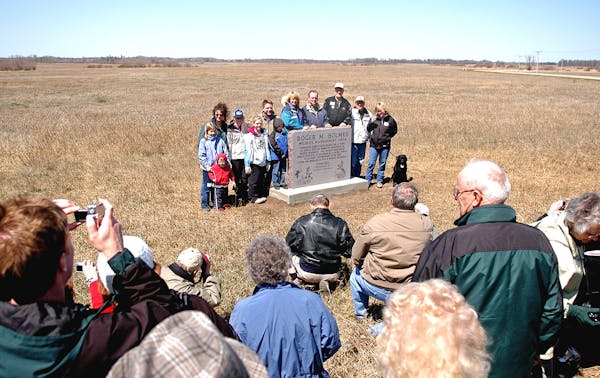Roger Holmes, a Duluth native who served as director of the Department of Natural Resources Fish and Wildlife Division for 10 years --gaining the respect of colleagues in Minnesota and nationwide, as well as hunters, anglers and legislators -- died at his home Wednesday in St. Paul.
The cause was complications from prostate cancer. He was 72.
Holmes, who worked for the DNR for 41 years, retired in 2000. He was honored last spring when a 1,000-acre wildlife management area near Alexandria costing more than $1 million was named for him.
Holmes began his DNR career in 1958. In 1962 he put himself on an agency fast track when he helped establish 25 wildlife management areas in Douglas and Pope counties in three years.
"Roger was a great leader," said Roger Johnson, who retired from the DNR in 2002 as a regional wildlife manager. "And what made him a great leader was his willingness to listen. He made sure he heard everyone's opinions, and he listened to them. Then he made his decision."
In 1972, Holmes became chief of the DNR wildlife section, and in 1990 he was named Fish and Wildlife Division director, holding that position until his retirement.
"Roger was always an impressive, imposing figure," said Ed Boggess, who joined the DNR in 1982 and is now its Fish and Wildlife Division deputy director. "The part that everyone saw was his dedication to, and passion for, natural resources. What wasn't so obvious was how much he cared about people. Not just staff, but all people, especially those who enjoyed natural resources."
Respectful when appearing before legislators, Holmes nevertheless was known to be direct when testifying at the Capitol on conservation issues.
"He would tell it like it was and might even pound the table once in a while," Boggess said. "He would say, 'Look, this is what we have to do.' He could get away with it because people could see his passion."
Three variations of no
Tom Isley, a retired DNR operations manager who worked for Holmes for decades, recalled a time years ago when Gov. Al Quie asked permission to ride a horse through Whitewater Wildlife Management Area.
"We don't allow horseback riding in wildlife management areas for a lot of very good reasons," Isley said. "The request came to Roger, and he told the governor no, and the trail ride was called off."
Isley said Holmes had three variations of "no" when resource protection was at stake.
"No, hell no, and over-my-dead-body no," Isley said.
Holmes' most far-reaching resource-management decision occurred in the early 1970s when he closed all of Minnesota to deer hunting because of low numbers of whitetail deer. Subsequent management decisions he and others in the DNR made contributed to the abundance of deer in the state today.
Recognized nationally as a conservation leader, Holmes was president of the International Association of Fish and Wildlife Agencies in 1998. Since retiring, he served on the Minnesota Center for Environmental Advocacy board of directors. He was an ardent supporter of the Clean Water, Land and Legacy amendment, which received voters' approval Nov. 4.
Holmes and his wife, Barb, spent their retirement years on their sailboat in Florida in winter, fishing at their cabin in Canada on Lake of the Woods in summer and hunting at his farm in Lac Qui Parle County.
Survivors in addition to his wife include his father, Ross, 99; three children, Kristin Schroeder of Roseville, Brad Holmes of Robbinsdale and Greg Holmes of Lino Lakes; five grandchildren; his twin sister, Marlene Craft; his younger sister, Karen Green Jung, and numerous nieces and nephews.
Visitation will be 4 to 7 p.m. Sunday at Galilee Evangelical Lutheran Church, 145 N. McCarrons Blvd., Roseville. A memorial service will be held at 11 a.m. Monday at Lutheran Church of the Redeemer, 285 North Dale St. in St. Paul

Twins win 12th in a row, longest winning streak in 33 years
Bruins taking lessons, sense of fight into 2nd-round matchup with Panthers

Two words about Game 1's fourth quarter: Naz Reid

